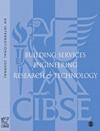User-based fuzzy end-use modeling of indoor urban residential water demand
IF 1.8
4区 工程技术
Q3 CONSTRUCTION & BUILDING TECHNOLOGY
Building Services Engineering Research & Technology
Pub Date : 2022-04-21
DOI:10.1177/01436244221085916
引用次数: 2
Abstract
Stochastic models for estimating residential water demand use high-resolution field data consuming large costs and significant time. An attempt for the accurate estimation of water demand may result in its complex analytical model due to numerous factors affecting the water use event. Moreover, as the water supply system is always subjected to variations in demand, the accuracy of water demand estimation in its design can be side-lined. The water demand in residential buildings is mainly governed by the users’ characteristics and their daily schedule. In this view, the use of Fuzzy Logic can be advantageous to model the uncertainty in water demands. The presented study attempts to provide a methodology to estimate urban indoor residential water demand with the help of user-based end-use models in the absence of field data and generate various possible water demand patterns of fixtures. Usergroups were created for assuming spatial variations in water demand. Fuzzy Logic was used to develop the end-use models using data on urban users’ characteristics, their diurnal activities, and water use habits to estimate the demand characteristics of fixtures. The model may also facilitate the computation of pipe sizing in building water supply systems.基于用户的城市室内居民用水需求模糊最终用户模型
估计居民用水需求的随机模型使用高分辨率的现场数据,耗费大量成本和时间。由于影响用水事件的因素众多,试图准确估算需水量可能导致其复杂的分析模型。此外,由于供水系统总是受到需求变化的影响,因此供水系统设计中需求估算的准确性可能会受到影响。住宅建筑的用水需求主要受用户的特点和日常作息时间的影响。在这种情况下,使用模糊逻辑可以有利于建模不确定性的水需求。本研究试图提供一种方法,在缺乏现场数据的情况下,借助基于用户的最终用途模型来估计城市室内住宅用水需求,并产生各种可能的固定装置用水需求模式。用户组的创建是为了假设水需求的空间变化。利用城市用户特征、日常活动和用水习惯等数据,利用模糊逻辑建立终端用户模型,以估计灯具的需求特征。该模型还可为建筑供水系统中管道尺寸的计算提供方便。
本文章由计算机程序翻译,如有差异,请以英文原文为准。
求助全文
约1分钟内获得全文
求助全文
来源期刊

Building Services Engineering Research & Technology
工程技术-结构与建筑技术
CiteScore
4.30
自引率
5.90%
发文量
38
审稿时长
>12 weeks
期刊介绍:
Building Services Engineering Research & Technology is one of the foremost, international peer reviewed journals that publishes the highest quality original research relevant to today’s Built Environment. Published in conjunction with CIBSE, this impressive journal reports on the latest research providing you with an invaluable guide to recent developments in the field.
 求助内容:
求助内容: 应助结果提醒方式:
应助结果提醒方式:


